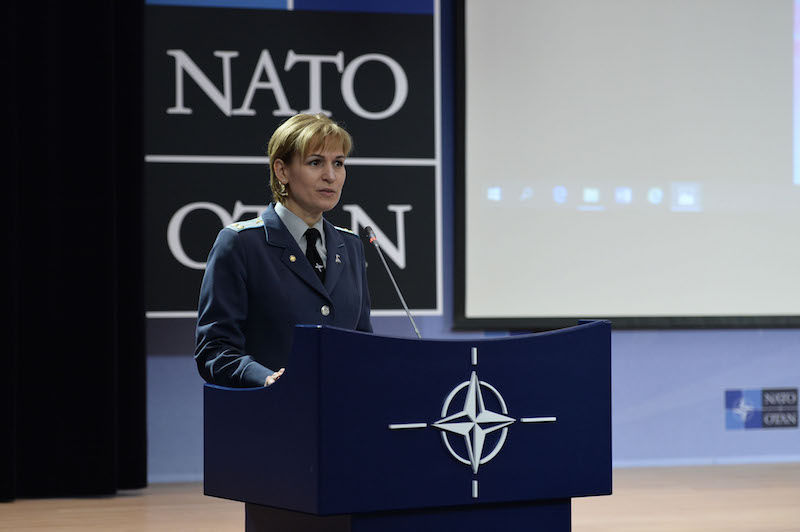From May 30 to June 3, 2016, NATO Headquarters in Brussels hosted the NATO Committee on Gender Perspective (NCGP) Annual Conference on the strengthening of military leadership and implementation of a gender perspective in NATO operations. The conference also marked the 40th anniversary of NCGP since its formal recognition by NATO’s Military Committee in 1976.
NATO’s senior female officers began organizing conferences on the implementation of gendered policy since its inaugural conference in Copenhagen, June 1961. Since then, the conference has been held on an ad hoc basis to discuss issues pertaining to women in NATO member nations’ armed forces. As seen through these NGCP conferences, NATO has been a prominent leader in setting the international standard for gender equality.
Recapping the Conference
NATO experts, member countries, and national delegates gathered to discuss the implementation of better gender mainstreaming practices among NATO member and partner countries attended the NGCP Conference. Notable attendees included Deputy Secretary General Alexander Vershbow, Special Representative of the Secretary General for Women, Peace and Security Marriët Schuurman, and Deputy Chairman of the Military Committee Lt. Gen Mark O. Schissler. Ambassador Vershbow noted that NATO has placed “gender perspective at the heart of [its] analysis, planning, execution and evaluation of [its] planning missions.”
Events at NGCP covered a variety of topics that emphasized the need for a modernized approach to how gender is addressed within NATO. Such subjects included: how media can support a more transparent military leadership, the role of education and training, and how civil society organizations can best support gender integration. An exhibition entitled “Women in NATO: From Pioneers to Champions since 1961” and featuring historic pictures of female military personnel was also inaugurated at NATO Headquarters.
Previous Conferences
NCGP conferences have been held annually since 2001. However, there are a few recent conferences that stand out as evidence of optimism and progress for gender integration.
The 2011 NCGP Conference appeared to have received much less media attention. It was attended by 35 delegates and observers representing 18 NATO member states on the theme of how gender can make a difference to security in operations. The conference elaborated on the NATO Action Plan to implement UNSCR 1325 into NATO-led operations, including crisis management, operational planning, and exercises, training and education. However, the meetings mainly focused on creating a summary of best practices to show the substantial influence that applying a gendered perspective can have in security operations and identified indicators to measure the success of programs and operations at a tactical level.
The 2011 NCGP meeting established that the indicators for effectiveness on gender integration were too general and needed to be adapted. Subsequently, delegates agreed to an ad hoc meeting in Rome in October 2011 to redefine the indicators. At the meeting, participants created a metric of gender integration that involved procedures, directives, operational impact, training, and human resources.
The willingness to re-group and re-formulate the gender indicators shows a cooperative success that member states and partner countries in attendance see the importance of gender and are committed to delivering concrete results.
The 2015 NCGP Conference continued to raise expectations for future conferences on gender equality. It was the largest conference in the history of NCGP, with 100 participants representing 20 NATO member states and 13 partner countries. The results of the Gender Equality in Military Project were presented by the Ministries of Defense of Montenegro, Macedonia, and Serbia, where they shared lessons learned and good practices, and participated in creating recommendations on better female recruitment and retention in the military, which the NCGP then adopted. It was also recognized that the preconditions to such retention include the existence of strong and effective gender equality mechanisms, gender responsive human resources and practices, and gender awareness.
The 2015 conference seemed to reaffirm the commitment established by its predecessors. However, it also indicates a shift since 2011 from operational efficiency and the means by which it is to be measured towards quality of experience and enhancing outreach.
Conference Trends: The Value of Accountability and Information Sharing
A comparison of the 2011, 2015, and 2016 conferences indicates a trend in NATO’s approach to achieving gender equality. Most notably, enforcing transparency, accountability, and information sharing have been crucial to NATO since 2011. It appears that there is a consensus among NCGP participants that achieving the goals of gender equality require more than a top-down approach to enact change. Instead, it requires cooperation from all actors to be mutually accountable in policy-making decisions.
NCGP conferences tend to receive limited media attention. If NATO values accountability and information sharing as means of including gender policy, member states and partner countries should publicize their efforts to embrace a gender perspective in their respective conduct, to influence other states to follow suit. The conferences highlight an important source of consensus building and international cooperation, thus having the potential to play a key role in transforming how gender is integrated within the military.
Photo: Chair of the NCGP LtCol Nevena Miteva welcomes participants to the 40th anniversary of the conference. Courtesy of NATO
Disclaimer: Any views or opinions expressed in articles are solely those of the authors and do not necessarily represent the views of the NATO Association of Canada.




